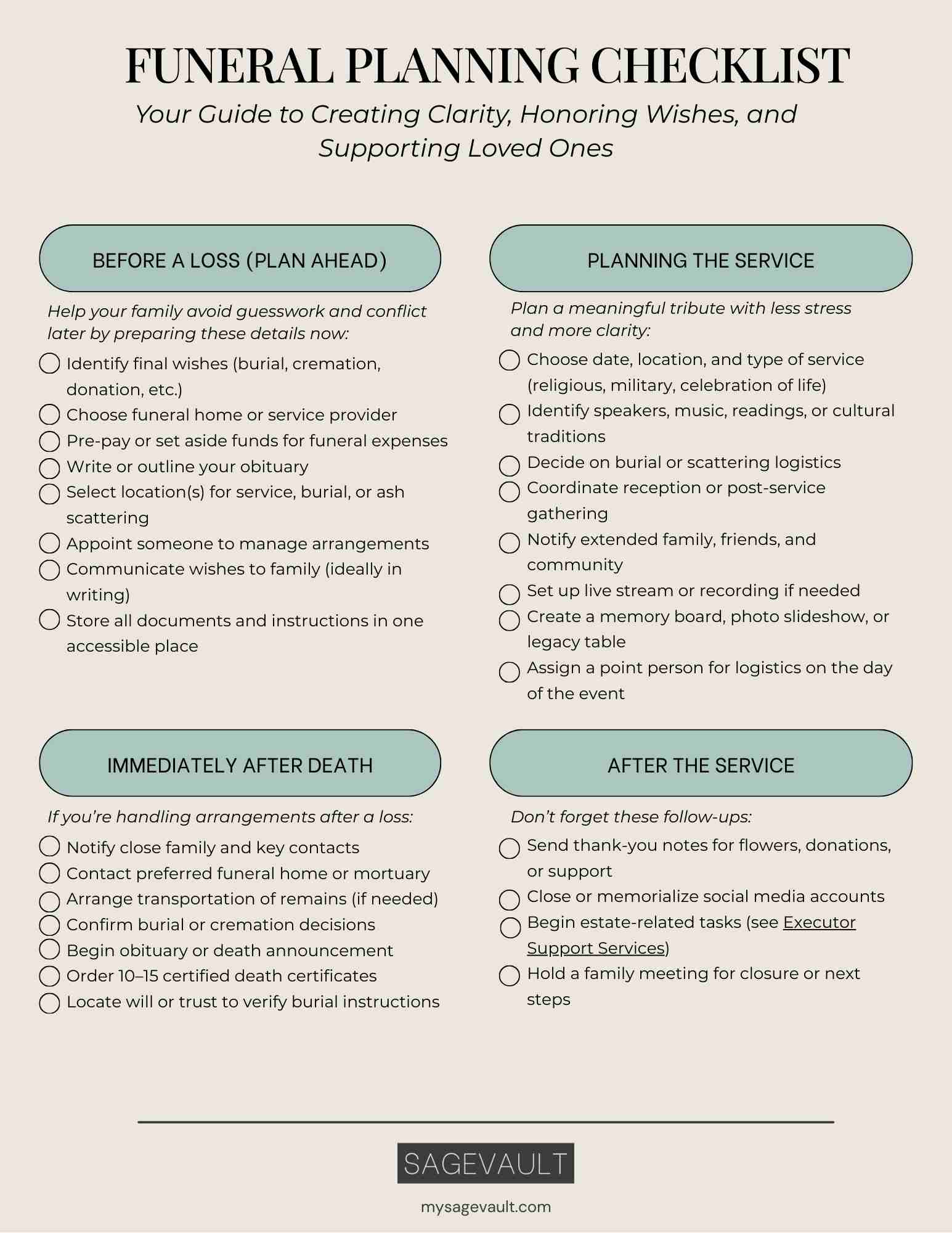
Funeral planning during a time of grief can feel overwhelming. When you’re responsible for honoring a loved one’s memory while managing countless details, having a structured approach can provide both comfort and clarity. This comprehensive funeral planning guide will help you navigate the process with confidence and care, ensuring you create a service that truly reflects your loved one’s life and supports those left behind.
🦉And if you’d like extra support along the way, a free downloadable Funeral Planning Checklist is available at the end of this guide to help you stay organized and ease the load.
Why Thoughtful Funeral Planning Matters
Funeral planning is more than just arranging a ceremony—it’s a crucial step in the grieving process for family and friends. A well-planned funeral provides an opportunity to celebrate a life, acknowledge the reality of loss, and begin the journey toward healing. When approached thoughtfully, funeral planning creates a meaningful space for expressing emotions and sharing memories.
Studies show that meaningful funeral rituals can actually help with grief processing, providing structure during a chaotic emotional time. Taking a structured yet compassionate approach to funeral planning helps avoid last-minute decisions that can feel rushed or create tension among loved ones. As difficult as planning may be, the ceremony you create will become an important touchstone for everyone who attends.
First Steps in Funeral Planning
Review Existing Plans and Wishes
Before making any arrangements, check if your loved one left funeral pre-arrangements or expressed specific wishes in their will or other documents. Review any existing funeral plans, pre-paid services, or burial instructions. This should be your starting point in funeral planning, as honoring their wishes is often the most meaningful approach.
Consult with Close Family Members
When engaged in funeral planning, consult with immediate family members before making any significant decisions, especially if you’re considering changes to pre-arranged plans. Be mindful of family dynamics and seek alignment when possible to prevent potential conflicts that can linger for years.
Understand Religious and Cultural Requirements
Different faith traditions and cultural backgrounds have specific funeral practices and requirements. If applicable, consult with religious leaders about:
- Required timing for the service
- Specific rituals or prayers
- Dress code requirements
- Food restrictions for gatherings
- Restrictions regarding cremation or burial
Select a Funeral Home
Choose a funeral home that aligns with your needs, budget, and values. When selecting a provider for your funeral planning:
- Research reviews and reputation
- Compare prices (funeral homes must provide itemized price lists by law)
- Consider location and available facilities
- Assess whether their staff makes you feel comfortable and supported
Essential Elements of Funeral Planning
Choose Between Burial or Cremation
If pre-arrangements don’t specify, you’ll need to decide between burial or cremation based on religious beliefs, cultural traditions, or your loved one’s known preferences:
- For burial: Selection of casket, cemetery plot, and headstone
- For cremation: Selection of cremation container, urn, and final disposition (burial, scattering, or keeping)
Cost is often a significant consideration in this decision. According to the National Funeral Directors Association (NFDA), traditional burial services typically cost 25-40% more than cremation options. The median cost of a funeral with viewing and burial is approximately $7,848-$9,995 (when including a vault), while a cremation with viewing and memorial service averages $6,280-$6,970 . For those seeking more affordable options, direct cremation without a service can range from $1,500-$3,000. This difference primarily comes from expenses related to embalming, casket selection, and cemetery fees.
Remember to check local laws regarding embalming, casket purchases, or scattering ashes, as regulations vary by location.
Decide on Service Type and Location
Your funeral planning should include selecting a service type that reflects your loved one’s personality and your family’s preferences:
- Traditional funeral service (with body present)
- Memorial service (without body present)
- Celebration of life
- Graveside service
- Religious service
- Home funeral
Consider locations that were meaningful to your loved one or practical for guests: religious buildings, funeral homes, community centers, parks, or even family property.
Estimate Guest Attendance and Venue Needs
Having a realistic idea of attendance helps with funeral planning:
- Consider the size and location of the service
- Plan for transportation, especially for elderly or out-of-town guests
- Decide whether to host a reception afterward
- Arrange for appropriate parking
Personalize the Service
Thoughtful personalization is an essential part of funeral planning. Include elements that reflect your loved one’s unique life:
- Select readings, poems, or religious texts that held meaning
- Choose music that was significant to them
- Display photos or create a video tribute
- Include personal items or symbols of their interests
- Invite friends and family to share memories
Remember that meaningful doesn’t always mean elaborate—sometimes simple, authentic elements are the most powerful.
Write and Publish the Obituary
As part of your funeral planning, you’ll need to draft an obituary that serves both as a notification and a brief biography:
- Include essential information (full name, age, date of death, service details)
- Highlight key life events and accomplishments
- Mention surviving and predeceased family members
- Consider where to publish (newspapers, online, funeral home website)
- Include a photo if desired
Keep a printed copy of the obituary handy to help with introductions and acknowledgments, especially helpful for executors who may not know every family member by name.
Important Considerations Often Overlooked in Funeral Planning
Security and Personal Belongings
Death unfortunately can create opportunities for those with illegal motives:
- Secure the deceased’s wallet, purse, and home
- Consider changing locks if there’s concern about unauthorized access
- Inform trusted neighbors or local authorities if the home will be empty during services
- Be aware of potential identity theft risk following a death
- Ask someone to stay at the residence during the funeral if possible
Veteran and Military Honors
For those who served in the military, special recognition is available and should be included in your funeral planning:
- Verify eligibility with the VA for military honors, including flag presentation and playing of Taps
- Request military honors early to ensure availability
- Inquire about burial in a national cemetery if applicable
- Apply for the government-provided headstone or marker available to veterans at no cost
Practical Documentation
When engaged in funeral planning, don’t overlook important paperwork:
- Order multiple death certificates (10-15 copies recommended)
- Executors will need these for banking, insurance, property transfers, and other legal matters
- Begin gathering information for the death certificate early (birth date, parents’ names, social security number, etc.)
Delayed Headstone Placement
Many people aren’t aware that permanent markers typically aren’t placed immediately:
- Wait 6-12 months before placing a permanent headstone to allow the ground to settle
- Ask your cemetery about temporary markers to honor your loved one in the interim
- Use this time to thoughtfully select a permanent memorial
Supporting Family Through the Funeral Planning Process
Manage Family Communication
Clear communication is essential during funeral planning:
- Share funeral details clearly with all relatives, including out-of-town guests
- Offer space for emotional expression while keeping the focus on honoring your loved one
- Be mindful of long-standing family dynamics
- Regular updates, even when there’s no news, can ease anxiety and prevent misunderstandings
Include Out-of-Town Family Members
Those traveling from a distance have special considerations during funeral planning:
- Include them in planning discussions when possible to avoid feelings of exclusion
- Inform them about bereavement fares or discounts available through airlines and hotels
- Consider arranging local transportation for them during their stay
- Help with accommodations if needed
Arrange Supportive Elements
Small thoughtful touches make a big difference in funeral planning:
- Provide food and water at the service to help guests stay comfortable
- Encourage others to bring meals to grieving family members in the days that follow
- Offer opportunities for guests to share stories, memories, or written messages
- Consider having tissues available and a quiet space for those who need a moment alone
Managing Costs of Funeral Planning
Funeral expenses can be significant, but meaningful services don’t need to cause financial hardship:
- The average funeral with burial costs $7,000-$12,000
- Cremation typically ranges from $1,000-$6,000
- Ask for itemized price lists and only select services you value
- Consider alternative caskets or urns, including eco-friendly options
- Check for veterans benefits, Social Security death benefits, or insurance policies that may help cover costs
After the Service: Next Steps in Funeral Planning
Thank You Notes
Consider sending acknowledgments to:
- Those who sent flowers or donations
- People who provided food or other assistance
- Pallbearers and those who participated in the service
- Close friends who offered significant support
Grief Support
Encourage family members to:
- Consider grief counseling or support groups
- Be patient with their grieving process
- Take care of their physical health
- Accept help when offered
Managing Expectations and Emotions
When engaged in funeral planning, remember:
- Not everything will go perfectly—set realistic expectations
- Grief affects everyone differently; expect a range of emotions from laughter to tears
- Both are part of the healing process
- Give yourself grace during this difficult time
Conclusion
Funeral planning is one of the most significant ways we honor those we’ve lost. By approaching this responsibility with intentionality and care, you create a lasting tribute that helps everyone begin their healing journey. Remember that there’s no single “right way” to plan a funeral—the most meaningful services authentically reflect the unique life being honored.
You don’t have to navigate funeral planning alone. If you’re facing the challenges of funeral planning or other executor responsibilities, SageVault is here to help. Our experienced advisors can guide you through this process with compassion and practical support. Contact us today to learn how we can help you move from confusion to clarity with confidence and care.

Free Download: Funeral Planning Checklist
Planning a funeral is never easy—but it can be easier with structure and clarity. Whether you’re making arrangements after a loss or thinking ahead for your own wishes, this one-page checklist walks you through the most important steps, so your family isn’t left overwhelmed or unsure.



